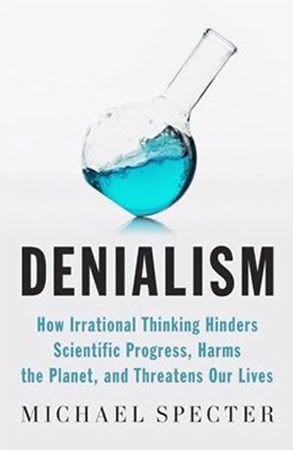 Michael Specter is a staff writer for the New Yorker. His new book, Denialism, asks why we have increasingly begun to fear scientific advances instead of embracing them.
Michael Specter is a staff writer for the New Yorker. His new book, Denialism, asks why we have increasingly begun to fear scientific advances instead of embracing them.
Specter recently spoke at the TEDGlobal2010 Conference, held over the course of four days in Oxford, England to explore “the shocking undercurrent of good news just below the surface of today’s troubling headlines — new ideas, new science, new technology, new social and political thinking, new art and a new understanding of who we are”.
While I don’t agree with everything Specter says here and I don’t disagree with a lot of it, one of the things that I cannot deny is that I’m not always wrong in my opinions. I doubt that you can either.
But nor am I always right.
Why Michael Specter is worth listening to:
Michael Specter’s new book, Denialism: How Irrational Thinking Hinders Scientific Progress, Harms the Planet and Threatens Our Lives, dives into a worrisome strain of modern life — a vocal anti-science bias that may prevent us from making the right choices for our future. Specter studies how the active movements against vaccines, genetically engineered food, science-based medicine and biotechnological solutions to climate change may actually put the world at risk. (For instance, anti-vaccination activists could soon trigger the US return of polio, not to mention the continuing rise of measles.) More insidiously, the chilling effect caused by the new denialism may prevent useful science from being accomplished.
Specter has been a writer for the New Yorker for more than a decade; before that, he was a science writer and then the Moscow bureau chief for the New York Times. He writes about science and politics for the New Yorker, with a fascinating sideline in biographical profiles.
Spend sixteen and a half minutes with Michael Specter here, and see if he doesn’t challenge some of your ideas that you might be wrong about. Or some you might be right about.
Recorded at TEDGlobal2010 – February 2010

8 comments
Skip to comment form
Author
Exxon, Cargill, GE and many others.
In my view why many people distrust science is that the media arms of big corporations tell us that “up is down” and “hot is cold”, based on scientists etc.
….This a part of the dynamic anyway.
in Africa who are committing suicide in despair because they were sold engineered grain that won’t grow without a lot of water. They don’t have a lot of water. They never had a lot of water. They weren’t told the grain needed a lot of water. Now their families are starving. And that doesn’t even touch the disgusting topic of grains engineered so that they won’t reproduce. Those grains weren’t engineered by faith healers. They were engineered by corporate scientists.
I saw a slick commercial on tv today advertising prescription … fish oil. Omega 3 fatty acids. You know, precisely the type of folk remedy Spector was so masterfully scornful of in his talk. Except now it’s been tinkered with a bit and repackaged by big pharma, so, VOILA!, it’s all wonderful and useful and scientific and expensive again and we should ask our doctor for it. Echinacea, which he attacked directly, works for me. I haven’t had a cold that lasted longer than three days in years. I’ll continue using it, thank you.
Specter rants about the disasterous mistakes made by those who eschew (or cannot afford, or do not have access to) modern medicine … but he dismisses the mistakes made by science as part a natural learning progression. Experimentation is necessary and never mind the collateral damage … some of which has been equally disasterous.
If someone were to ask me–which they haven’t, but I’m old enough to spout off anyway–the biggest disconnect between scientists and non-scientists today is that bystanders like me see scientists rushing recklessly ahead, scrambling to beat each other to the next big discovery, for fame and royalties, without having a fucking clue about the consequences of unleashing their discoveries on the world. Worse, too many of them, in their arrogance, don’t seem to care how much damage they may do.
Believe it or not, I’m not opposed to the scientific method or those who use it. I’m opposed to those who abuse it.